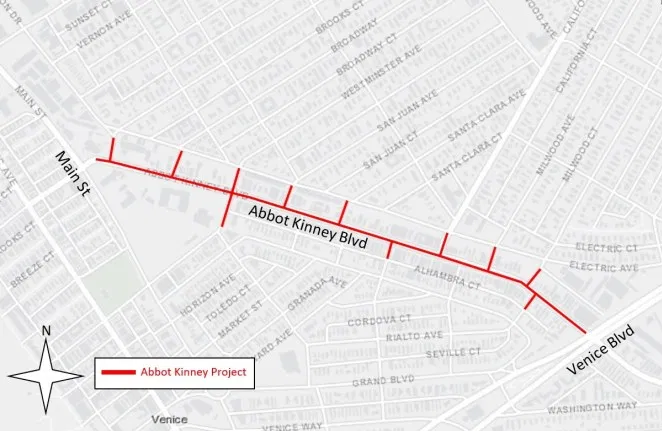Abbot Kinney has long been known as, in the words of its merchant's association, "A mile-long strip of the latest fashion, art, and food." Thanks to a proposal by the Los Angeles Department of Transportation, it may soon be able to add "progressive parking policy" to that description.
At a public meeting tomorrow night (see the flyer, here), the LADOT will unveil a new plan that could radically alter the parking situation along the business district of Abbot Kinney in West Los Angeles. The meeting will be held on Thursday from 6:00 p.m. to 8:00 p.m. at Westminster Avenue Elementary School (1010 Abbot Kinney Blvd.)
If someone chooses to drive to Abbott Kinney, they have likely found the parking experience to be difficult. There is very little off-street parking, and the unmetered, untimed on-street parking is almost always full. This creates safety and mobility issues as drivers wait in the middle of the two-lane street for parking spaces to become available, and distracted drivers looking for parking can be a hazard to everyone.
The Abbott Kinney Merchant's Association and the Office of Councilmember Mike Bonin both asked the city to examine whether a parking meter program would be a good investment for the area on Abbot Kinney between Venice Boulevard and Main Street. Unmetered, un-permitted parallel streets would also see changes of some sort, depending whether they are residential or commercial.
Apparently, LADOT believes the idea has merit. The highlights from LADOT's plan include the installation of :
- 196 parking meters at on-street spaces
- 7 accessible parking spaces for individuals with disabilities
- 18 motorcycle-specific stalls
- 9 on-street corrals for e-scooters and e-bikes, to reduce clutter on the sidewalks
Parking rates at metered motorcycle spaces will be half the rate of automobile metered spaces. Time limits will be the same for both. Meters would have a two-hour time limit, and would be in effect from 8 a.m. until 8 p.m. The meter program would be part of LADOT's Express Park program.
L.A. Express Park is a “performance-based parking pricing program." Similar programs are also sometimes called “variable-price parking” or “demand-based parking.” The way it works is that the city monitors how full on-street parking spaces are, then adjusts parking meter prices up or down, with a goal of keeping between ten and thirty percent of the spaces available. On blocks where less than seventy percent of meters are occupied, hourly rates would go down. On blocks where it is very difficult to find an open space, hourly rates would go up. Meter rates also vary by the time of day and the day of the week.
Express Park was initially implemented in downtown Los Angeles in 2012. The program manages about 6,300 curb parking spaces there. The project has spread throughout the city and includes 500 spaces in Westwood and about 900 spaces in Hollywood.
Final pricing for the meters has yet to be determined. The new meters will take payment via credit card, phone app, or coins. There has been no announcement as to what the parking meter revenue would go towards after recouping the capital and operating costs of the program.






